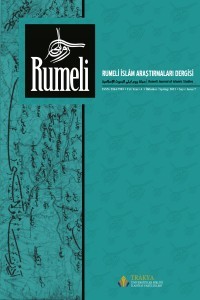İslam Ve Yahudi Geleneğinde Peygamberler ve Peygamberlik
İslam ve Yahudilik, dünya tarihinin monoteist karakterli iki önemli dinidir. Her iki din de Semitik kökenli olmaları nedeniyle benzer dini kavram ve fenomenlere sahiptir. Peygamberlik de bu ortak dini fenomenlerden birisidir. Çevirisini yaptığımız bu makalede yazar, her iki dindeki peygamberlik olgusunu mukayese etmekte, benzer ve farklılıklarına dikkat çekmektedir. Yazar, Hz. Musa'nın ve Hz. Muhammed’in peygamberliklerinin kendi temel kutsal metinlerinden (Kur’an – Tanakh) ve geleneklerinden hareketle toplumları tarafından nasıl büyük bir onur içinde kabullenildiğine vurgu yapmaktadır. Yazara göre, Müslümanlar ve Yahudiler, Hz. İbrahim’in bütün peygamberlerin atası olduğunu kabul ederler. Ancak Yahudilere göre Hz. Musa en büyük peygamberdir ve peygamberlik çağı Malaki (M.Ö. 5. yy) ile son bulmuştur ve yeni bir peygambere ihtiyaç yoktur. Oysa Müslümanlara göre ise Hz. Muhammed (SAV) peygamberlerin sonuncusudur. Yazara göre bir diğer önemli fark ise, peygamberlerin Tanrıya ve toplumlarına karşı olan davranışlarıyla ilgilidir. Örneğin Yahudi peygamberlerinin sözleri hukuk için temel bir kaynak oluşturmadıkları gibi, onların hayatları da kendilerine tabi olanlar için bir rol model olma özelliği taşımazlar. Yine Yahudilikte peygamberler zaman zaman tanrı Yahova ile tartışırlar. Oysa bunların İslam inancı açısından düşünülmesi bile mümkün değildir. Yazar, makalesinde bu görüşlerini, her iki dinin kaynaklarından verdiği değişik örnekler üzerinden giderek detaylı bir şekilde irdelemeye çalışmıştır.
Anahtar Kelimeler:
İslam, Yahudilik, Peygamberler, Hz. Muhammed, Hz. Musa
PROPHETS AND PROPHECY IN THE ISLAMIC AND JEWISH TRADITIONS
Islam and Judaism are two important monotheistic religions in world history. In both Islam and Judaism have similar religious phenomena and concepts due to their semitic origin. Prophethood is one of these common religious phenomena. In this article we have translated, author William Brinner, compares the prophethood in both religions and draws attention to similarities and differences. The author emphasizes how the Prophet Moses and Mohammad were accepted by their communities in a great honor in terms of their basic scriptures (Qur’an – Tanakh) and traditions. According to author, Muslims and Jews recognize that Abraham was the ancestor of all prophets. However, there are some differences between two of them. According to Jews, Moses is the greatest prophet and prophetic age had been closed with Malakai (BC 5th) and that they had no need of a new prophet. However, the Muslim community claimed that the last prophet is a Mohammed (Peace be upon him). According to the author, another important difference is the behavior of the prophets towards God and their societies. In terms of Jews words of the prophets dont form the basis for law, nor do the lives of their serve as models for others to follow. In Judaism, also prophets sometimes argue with Yahweh. But these are virtually unthinkable in the Islamic belief. The author, in his essay, tried to examine these views in detail through different examples from the sources of both religions
___
- Huston Smith, The Religions of Man, (New York: Harper and Row, 1964), 241 Abraham J. Heschel, The Prophets, (Philadelphia: Jewish Publication Society,1962.), 398- 403 T.H. Robinson’un, An Introduction to the Books of the Old Testament (London: Macmillan, 1934, s. 350) Shalom M. Paul, “Prophets and Prophecy” Encyclopedia Judaica I-XVI. (Jerusalem: Keter Publishing, 1971), XIII/1151-1175 . . .
- ISSN: 2564-7903
- Yayın Aralığı: Yılda 2 Sayı
- Başlangıç: 2018
- Yayıncı: Trakya Üniversitesi
Sayıdaki Diğer Makaleler
17. Yüzyıl Şairlerinden Tulû‘Î ve Rahşiyye’si
Hoca Râsim Efendi ve Anglikan Kilisesi’ne Cevap
Türkiye’de Müsnedler Üzerine Yapılan Çalışmalarla İlgili Bibliyografik Bir İnceleme
Osmanlı İlim, Düşünce ve Sanat Dünyasında Balkanlar
İslam Ve Yahudi Geleneğinde Peygamberler ve Peygamberlik
Bulgarıstan’daki Medresetü’n-Nüvvab’ın Önemi ve Etkisi
Münâsebâtü’l-Kur’ân (Âyet ve Sûreler Arasındaki İrtibatı Yeniden Düşünmek)
Sultan II. Abdülhamid Döneminde (1876-1908) Dedeağaç
Manastırlı İsmail Hakkı ve Mevâidü’l-İn‘Âm fî Berâhîni Akâidi’l-İslâm Adlı Eseri
